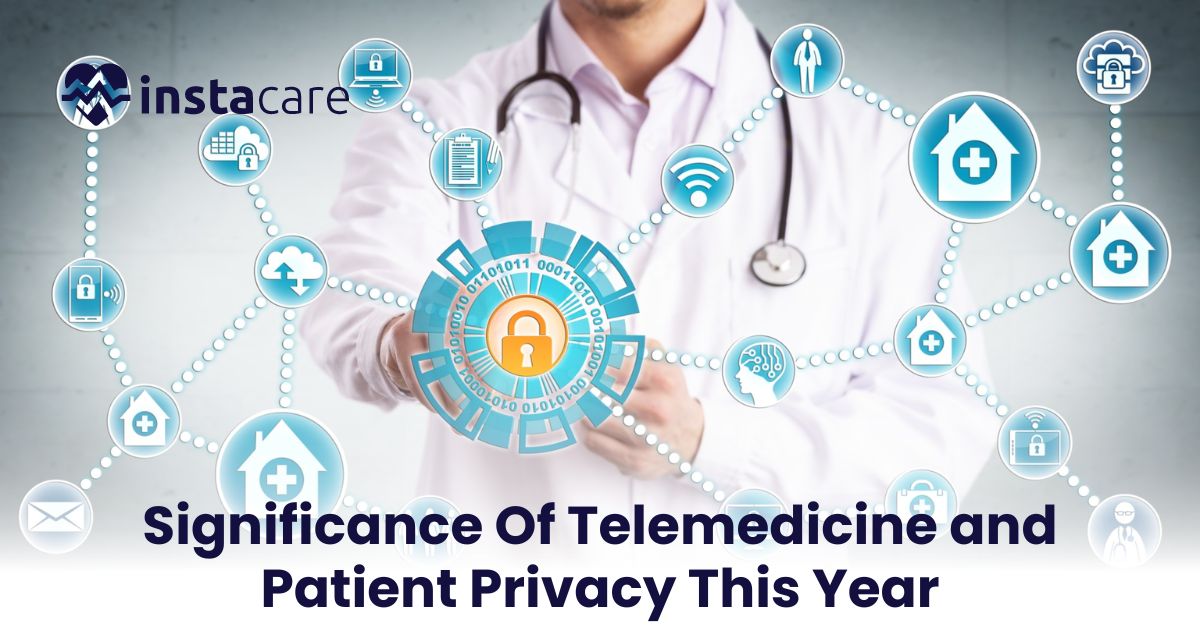Last updated on Thursday, 30, May, 2024
Table of Contents
Understand The Significance Of Telemedicine and Patient Privacy This Year
In the landscape of healthcare, two pivotal aspects stand out in 2024: the potential of telemedicine and patient privacy rights. That is why as a growing utilization of technologies to present and access health services is established, these concepts become more essential.
Telemedicine, the broad use of telecommunication and information technologies to deliver healthcare, has become one of the new industry shapers of the years. Geographically, its importance is that it outlines the delivery of a number of health care facilities with no consideration of the distance or geographical location.
Healthcare Facilities With No Consideration Of The Distance And Location!!
1-Convenience and Accessibility
The primary advantage of telemedicine, which is rather obvious, is the fact that through it, one can save a lot of time. People are no longer very restricted when it comes to places of destination and time they need to spend waiting in a hospital to be attended to. In a way of telemedicine, consultations can take time via online, thus saving time to make the efforts.
2-Improved Healthcare Outcomes
Since it involves the use of technology to diagnosis and treat the patient over a distance, telemedicine helps to administer timely prevention and follow-up continually. This saves time, as patients can get their diagnosis, treatment, and continued monitoring and care for their conditions, improving overall treatment outcomes. In addition, telemedicine can similarly increase the access by the provider to a broader population than it would otherwise be able to see in traditional care setting while avoiding cases where some individuals are left behind with no access to necessary services.
3-Enhanced Confidentiality and Security
Recognizing the importance of telemedicine and patient privacy ensures that individuals’ confidential medical information is protected and secure. By understanding the significance of patient privacy measures, healthcare providers can implement robust security protocols, such as encryption technologies and secure data storage practices, to safeguard sensitive patient data during telemedicine consultations. This enhanced confidentiality instills trust and confidence in patients, encouraging them to engage in telemedicine consultations knowing that their privacy is prioritized and protected.
4-Efficient Healthcare Delivery
With an understanding of telemedicine’s significance, healthcare providers can streamline healthcare delivery processes. Telemedicine allows for quicker access to medical consultations and reduces waiting times for patients. By embracing telemedicine and patient privacy optimizing its use, healthcare providers can increase the efficiency of their practices, leading to better patient satisfaction and improved healthcare outcomes.
5-Telemedicine And Patient Privacy in the Electronic Environment
Conversely, employee productivity could be a weak link since telecommunication brings the office setting into the home, where patient privacy is more of a concern than in the workplace. Currently, due to advancement in healthcare provision or delivery most of the important data regarding patients can be easily accessed and shared through the use of the internet hence making it more difficult to protect the data than before yet very essential to do so.
6-Compliance with Regulations
As a result of the typical nature of these records, along with many others, there are federal guidelines that healthcare providers need to follow in order to safeguard patient’s privacy such as the Healthcare Information Portability and Accountability Act (HIPAA). It describes the mode of handling, either in paper or electronically, of patients’ details and the measures we undertake to maintain their privacy and confidentiality.
7-Data Encryption and Security Measures
Ensuring that patients’ information is safe is a critical aspect that requires effective implementation of various secure code encryption technologies and security features. Secure video conferencing, various messaging, and collaboration platforms help adhere to HIPAA rules and protect the patient’s data.
8-Informed Consent
Telemedicine and Patient privacy is relevant to patient care, and there must be transparency and informed consent on the part of the patient. Telemedicine consultations need to provide patients with information regarding the ways their data will be utilized as well as shared, so that the patient could make satisfactory decisions regarding the healthcare process.
Virtual Healthcare Services And Patient Rights To Privacy
Telemedicine grows continuously and, in the year 2024, patient privacy concerns increase and are closely related to each other than ever before. With telemedicine being one of the fast-growing areas in the practice of medicine, patient privacy is emerging as a critical concern for care providers and government authorities.
View More: Streamline Your Medical Billing with Medical Billing Software
1-Balancing Innovation with Ethics
On personal note, despite the technological advancement that telemedicine presents in the delivery of healthcare services, patient privacy cannot be an option for a toss. Many hospitals and care practitioners continue to investigate ways to use technology in order to enhance patient care, while at the same time protect the patient’s right to privacy.
2-Education and Awareness:
In expanding the knowledge of telemedicine, it has to be communicated to both the healthcare provider and consumers of the services that patient privacy is sacrosanct. By ensuring that every member of the team understand what good and bad practices of telemedicine are and what the guidelines of patient’s privacy are, we can make a positive change regarding telemedicine use.
Conclusion
Indeed, the application of telemedicine and patient privacy in 2024 could be described as critical. Because technology is increasingly becoming an integral part of the governing processes in the healthcare industry, the protection of the rights of patients is very important in every administrative process. From those arguments, we can infer about the subject of telemedicine and patient privacy as the foundation of a more convenient and efficient healthcare environment.
FAQS
What telemedicine actually is and how does it function?
Telemedicine means to deliver health care services through the application of technology including telecommunication technology e.g. video conferencing and even home monitoring devices. Patients can ask doctors and other health care professionals questions, get a diagnosis, and even get prescriptions over the internet without the necessity to come in personally. Telemedicine can be defined as timely exchange of information between patients and healthcare providers while accomplishing healthcare missions.
How telemedicine is protective of patient’s privacy?
Security checkpoints are used in telemedicine systems to reduce the level of risks concerning the patient’s privacy. Such measures include use of encryption and hashing in transmission to prevent loss of data, measures put in place to ensure the authenticity of the users such as login details, and compliance to certain laws like the HIPAA to ensure patient information is not divulged to unauthorized persons.
What are the benefits of telemedicine for patients?
Telemedicine benefits patients in many ways: it provides an improved and convenient access to medical care to patient, especially in rural areas and areas with scarcity of medical practitioners. This removes the need to have to travel as well as the long waits that one might experience affording access to health care. In addition, telemedicine can quickly organise consultations, monitor chronic diseases, and access specialists that are out of geographical proximity, which in result is likely to improve the overall health of the population.
How can patients ensure their privacy during telemedicine consultations?
Telemedicine being open to the public, patients can consider several measures to protect their privacy during the virtual visits. Firstly, it is crucial to select a secure and appropriate telemedicine platform that obeys all the rules of keeping patients’ information private. Patients also need to confirm the identity of the healthcare provider before transferring any information about themselves or their health/medical conditions.



